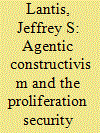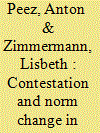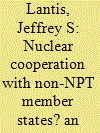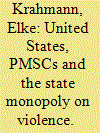|
|
|
Sort Order |
|
|
|
Items / Page
|
|
|
|
|
|
|
| Srl | Item |
| 1 |
ID:
147693


|
|
|
|
|
| Summary/Abstract |
Recent developments in global politics and international relations theory have raised questions about the strength of international norms. Critical constructivists identify instances of norm change, contestation, and even regress, arguing that norms may be less deeply internalized and more fragile than often assumed. This study builds on contemporary constructivist scholarship to advance a model of elite-driven norm change with stages of redefinition and substitution through contestation. It conducts a plausibility probe of the model by analyzing the development of the Proliferation Security Initiative, the US-led program that appeared designed to change normative principles from non-proliferation to counter-proliferation and from freedom of navigation on the high seas to maritime interdiction of suspect weapons and technology shipments. The model lends valuable insights on the evolution of norms to accommodate new realities over the last decade, and it suggests the need for more contingent and multi-linear theories of international cooperation.
|
|
|
|
|
|
|
|
|
|
|
|
|
|
|
|
| 2 |
ID:
185245


|
|
|
|
|
| Summary/Abstract |
Elephants and whales took center stage in the environmental movements of the 1980s. As flagship species, they were the poster children of global initiatives: international ivory trading and commercial whaling were banned in the 1980s in the context of the Convention on International Trade in Endangered Species of Wild Fauna and Flora (CITES) and the International Whaling Commission (IWC), respectively. While the conservation of both species is contested, we observe a change of existing norms in one case but not in the other: A moratorium on commercial whaling remains in place. Meanwhile, a limited shift to sustainable use regarding ivory was passed in 1997/2000. We ask why norm change occurred in one case but not the other, given their similarities. We argue that the difference can be explained by the perceived legitimacy of the claims of norm challengers using arguments of “affectedness” and the breadth of issues covered by CITES. In contrast, other factors commonly discussed in norms research do not explain this puzzle: the relative power and strategies of norm advocates and challengers, and the degree of legalization. This shows the interplay of discursive aspects and concrete institutional opportunities for norm change, even in the face of otherwise inopportune conditions.
|
|
|
|
|
|
|
|
|
|
|
|
|
|
|
|
| 3 |
ID:
146640


|
|
|
|
|
| Summary/Abstract |
The Millennium Development Goals guided international poverty reduction efforts from 2000 until 2015 and they will be succeeded by the 2030 Agenda for Sustainable Development, which will be guided by a new set of goals, the Sustainable Development Goals (SDGs). It is argued here that since the process of formulating SDGs, targets, and indicators for their implementation brought together actors with different (and sometimes competing) issue frames, values, and agendas for discussions that clarify the content of norms and their scope, this process can bring about norm contestation and norm change. This article uses an issue that was raised in the context of the SDGs – land rights – to illustrate processes of international norm contestation, evolution, and change. In doing so, it contributes to the growing body of literature that views norms and their content and boundaries as dynamic.
|
|
|
|
|
|
|
|
|
|
|
|
|
|
|
|
| 4 |
ID:
158675


|
|
|
|
|
| Summary/Abstract |
Supporters of the nuclear nonproliferation regime argue that international agreements, power politics, and emerging standards of legitimacy have generated a robust nuclear nonproliferation norm. This optimism is mirrored in early social constructivist international relations theory, which emphasizes the constitutive and regulatory power of international norms. Conversely, this article explores how recent developments in global politics and international relations theory may show how vested players can change normative architectures. This project develops a model of elite entrepreneurship in norm change that includes stages of redefinition and substitution through contestation. It conducts a plausibility probe of the model in the development of the 2008 U.S.–India Civil Nuclear Cooperation Agreement, a case of U.S.-driven norm change. The article concludes that this alternative agency-based model lends insights on what may be a continuous, and consequential, evolution of the nuclear nonproliferation norm.
|
|
|
|
|
|
|
|
|
|
|
|
|
|
|
|
| 5 |
ID:
145723


|
|
|
|
|
| Summary/Abstract |
There is a lively debate in constructivism today regarding the constitutive and regulatory power of international norms. First-generation studies assume that when states support norms they have fully “internalized” normative ideals. However, the scholarship tends to privilege structure over agency and may not account well for changes in state policies that impact normative architectures. This study extends recent work on agentic constructivism and international law to develop a typology of “norm stewardship” and model of norm change. It conducts a plausibility probe of the new stewardship model by comparing case studies of US policies on exports of sensitive uranium enrichment and reprocessing (ENR) technologies. Case evidence suggests that variations in norm internalization and dissonant norm strains impact multilateral initiatives on nonproliferation. This study concludes with a discussion of wider implications of norm stewardship for theories of international cooperation.
|
|
|
|
|
|
|
|
|
|
|
|
|
|
|
|
| 6 |
ID:
171767


|
|
|
|
|
| Summary/Abstract |
Contestation of international norms has become the new focus of IR norm research. The optimism of the 1990s that fundamental liberal norms would diffuse globally has remained unfulfilled in recent years—even human rights norms have witnessed strong contestation. Time and again, controversy has erupted regarding international norms such as the ban on torture or the Responsibility to Protect. Meanwhile, we know little about how such controversy affects the robustness of norms—whether it contributes to their weakening or to their strengthening. Existing research offers two competing hypotheses: One branch of norm research often conceptualizes contestation as a sign of norm weakening. By contrast, another branch assigns contestation a normative power of its own, which strengthens norms. It does not specify the limits of such normative power, however. In this article, we argue that contestation per se is a poor predictor of norm robustness. The type of contestation a norm faces matters. Contestation can either (1) address the dimension of application of a norm or (2) examine its validity by questioning the righteousness of the claims a norm makes. The article draws on two illustrative case studies of extensively contested norms, the Responsibility to Protect and the ban on commercial whaling. We argue that widespread contestation of the very validity of a norm is likely to lead to a loss of norm robustness. Applicatory contestation, by contrast, can—under specific circumstances—even strengthen it.
|
|
|
|
|
|
|
|
|
|
|
|
|
|
|
|
| 7 |
ID:
120088


|
|
|
|
|
| Publication |
2013.
|
| Summary/Abstract |
The proliferation of private military and security companies (PMSCs) in Iraq and Afghanistan has raised many questions regarding the use of armed force by private contractors. This article addresses the question of whether the increased acceptance of PMSCs indicates a transformation of the international norm regarding the state monopoly on the legitimate use of armed force. Drawing on theoretical approaches to the analysis of norm change, the article employs four measures to investigate possible changes in the strength and meaning of this norm: modifications in state behaviour, state responses to norm violation, the promulgation of varying interpretations of the norm in national and international laws and regulations, and changes in norm discourse. Based on an analysis of empirical evidence from the United States of America and its allies, the article concludes that these measures suggest that the USA is leading the way towards a transformation of the international norm of the state monopoly on violence, involving a revised meaning. Although this understanding has not yet been formally implemented in international law, it has allowed a growing number of countries to tolerate, accept or legalize the use of armed force by PMSCs in the international arena.
|
|
|
|
|
|
|
|
|
|
|
|
|
|
|
|
|
|
|
|
|